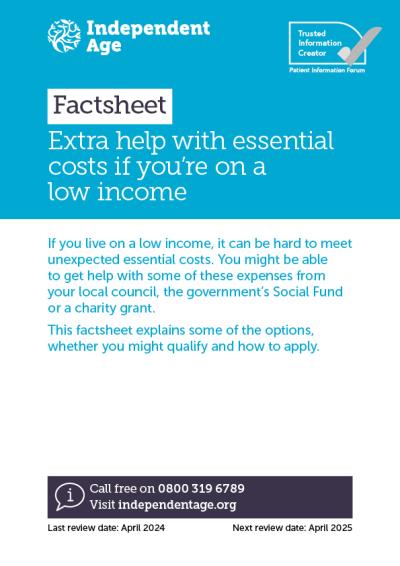Related publications

Extra help with essential costs if you’re on a low income

Pension Credit

Universal Credit will only affect you if you or your partner are below State Pension age. There are also other benefits you may be able to claim if you're on a low income.
Universal Credit is a means-tested payment that you could get if you're on a low income or out of work. You must meet some extra criteria to qualify for it – for example, you should have £16,000 or less in savings.
Universal Credit replaces the following benefits (called legacy benefits):
If you're getting legacy benefits
If you're currently claiming any of the legacy benefits listed above, you'll eventually be moved to Universal Credit. You don't need to do anything now. It is usually better to wait until you are asked to move over to Universal Credit, instead of claiming Universal Credit yourself. This is because once you claim Universal Credit, you can’t go back to claiming legacy benefits. You cannot make a new claim for any of the legacy benefits.
However, if your circumstances change, you might have to claim Universal Credit. It’s best to get advice for your situation – contact our Helpline to arrange to speak to an adviser.
Benefits not replaced by Universal Credit
Contribution-based ESA and Contribution-based JSA were not replaced by Universal Credit and are not included in these legacy benefits. You can't make new claims for them. However, if you’re already receiving them, they’ll carry on until either their end date or until your circumstances change.
You may be able to make a new claim for New Style ESA and New Style JSA. These have replaced Contribution-based ESA and Contribution-based JSA and you can claim them if you have enough National Insurance contributions and National Insurance credits from the two previous tax years. These benefits can be paid alongside Universal Credit if you qualify for them. However, if you get them, they’ll be considered when calculating how much Universal Credit you’re entitled to.
To qualify for Universal Credit, you must:
Check if you should be applying for Universal Credit by using the Citizens Advice eligibility checker.
If you and your partner (if you have one) are over State Pension age, you may qualify for Pension Credit. See our guide Pension Credit.
If your partner is under State Pension age, you cannot claim Pension Credit or Pension-age Housing Benefit. You will need to claim Universal Credit instead.
Once you both reach State Pension age, your Universal Credit will stop and you may be able to claim Pension Credit or other benefits. Find out what you could be entitled to by using our Benefits calculator or calling our Helpline to arrange a benefits check.
You usually need to apply online for Universal Credit. You can also apply by phone, by calling the Universal Credit helpline on 0800 328 5644. You may also be able to get someone to visit you at home if you:
If you're worried that you cannot apply for Universal Credit without help, Citizens Advice has a Help to Claim service that you can use.
Remember that if you’re receiving any of the legacy benefits, it’s best to check whether or not you’ll be better off on Universal Credit before applying.
To apply you need to prove your identity, and your partner's identity, if you have one. To do this, you will usually be asked to provide two of the following:
You'll also need to provide information about your income and assets, such as savings or investments, your housing costs and any disability or health condition that affects your work.

Find out more about Universal Credit online or by calling the Universal Credit helpline.
If you're under State Pension age, contact your local Citizens Advice for more information, or call our Helpline if you or your partner are over State Pension age.